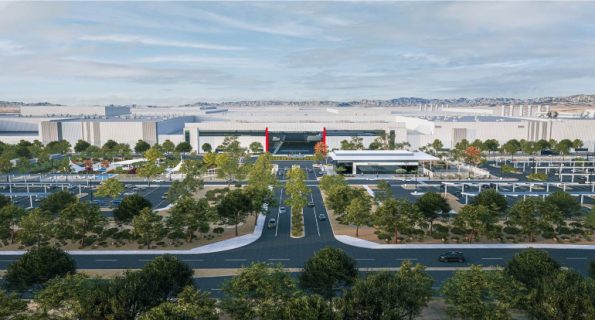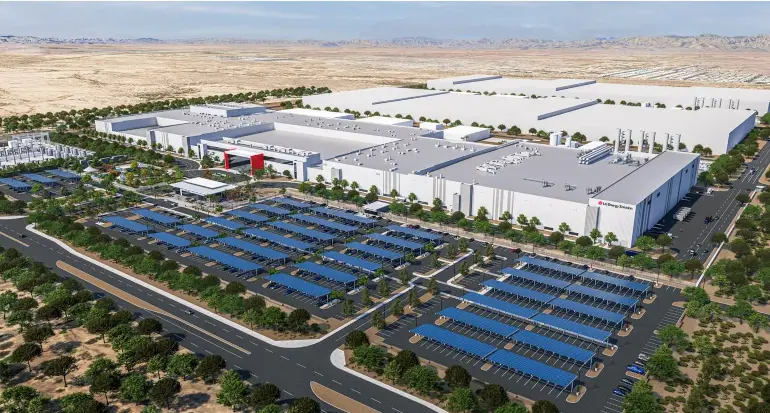Ground breaking for the LG Energy Solution‘s 53-GWh Battery Manufacturing Plant in Arizona is completed that its construction has begun, when announced last year. The targets of the two plants focused on the manufacture of battery packs for electric vehicles and independent energy storages systems will be established at the end of next year. LG, which invests $5.5 billion in this construction project, is building the world’s first lithium-ion battery factory in the U.S.
These facilities will not only serve as LG’s first ever standalone cylindrical and ESS battery plants in North America but also as the company’s second solar module plant and its first EV component facility in the region. The circular manufacturing site that is nicknamed LGEA (LG Energy Solution Arizona) will be the sole source of production of 46-Series battery packs for the EVs. At the same time, the 46-Series batteries will be on the way of large scale production at its Ochang plant, Korea, later this year, while the Arizona plant is ready to maintain this pace of work.
LG’s large-scale battery production plant, the LG Energy Solution Arizona ESS, will exclusively produce LFP pouch-type batteries, one of the most important components of ESS LG can deliver on this initiative by building this standalone battery facility in North America. Local manufacturing of batteries especially in the United States will be very effective to cater for the growing demand of batteries that is heavily affected by the energy clean policies prevalent in the country which has the largest battery market in the globe.
Capacity
Once at the operational stage, LG Energy Solution’s 53-GWh Battery Plant in Arizona is expected to achieve an average annual production capacity of 53 GWh having been contributed by 36 GWh for cylindrical cells and the remaining 17 GWh by the Lithium Iron Phosphate ESS batteries.
The project construction is broken, according to the plan, the ground laid offs in the November, then in the December, the first terrain work finished and the steel beams start to install at the site.
Completion date
The progress of building construction is scheduled for delivery now, since the EV battery manufacturing facility is due for completion by the end of 2025 and LFP ESS (energy storage system) battery will be embodied with the principle of rigorous work and straightforwardness in one go. The estimate is that commencement of construction, on both sites, will be in 2026 if it is ever started.

In the meanwhile, LG Energy Solution is not only in charge of the laying on the expanding facilities, but also recruiting, training and the maintaining of a highly qualified workforce to run the complex system. With the creation of around 2 to 3 thousand new jobs the project will enhance the local employment rate. “This launch team is the foundation of our efforts and we will begin our first wave by the end of the current year. The remaining recruitment will happen in the second half of the year 2025,” Richard Ra, LG Energy Solution Arizona’s president said.
ESS, that is Electrical Storage System, is essential part of green energy infrastructure, said Kim, Hyung, the Head of ESS Battery Division. As ESS provides flexible and reliable power supply, utilization plays an influential role. Kim pointed out that Arizona could gain this sustainability mostly in the field of building green energy infrastructure utilising abundant solar energy. Standing on his podium, he communicated this optimism that by using Arizona-built high quality batteries the different states shall be able to light up the nation.
On the top of that, LG Energy Solution affirms that this Michigan factory expansion actually be over within five years of production operation annually. This is hence the location of the core production facility and the presence of five more joint venture edifice locations in the U.S (G.M), Honda, and Hyundai Motor for the Hyundai Motor Group. The evident want of the LG batteries is to replace the traditional batteries which will have a national impact on cutting down on the use of the current ‘outdated’ and not friendly to the environment battery technologies.
Read also Longroad Energy begins construction on Sun Streams 4 solar, Arizona
Read also US$559 Million Secured for 1GW Scatter Wash Battery Storage Complex in Arizona

